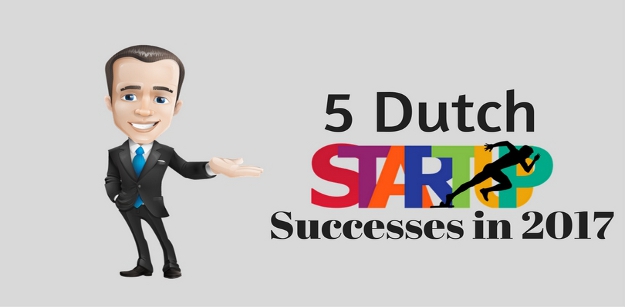There are plenty of great reasons to visit the Netherlands, but an increasingly popular (and permanent) one is to start a business. Since the Startup Delta initiative began in 2014, the country has become Europe’s premier destination for innovative startups, with firms spread across its capital and major cities.

While the Dutch startup landscape has come to prominence through its tech companies, there is a diverse array of talent across several thriving sectors. Here are six of the most prominent, promising and inspirational startup stories of 2017.
[AdSense-B]
When it comes to developing technologies, nothing feels quite so futuristic as AI. Enter Aigency, which – true to its name – purports to be the world’s first agency for AI. In reality it’s more like an iTunes style library for AI related tools and services, such as algorithms and bots. Developers list themselves on the platform, and Aigency takes a cut when they make a sale.
As well as an online marketplace, Aigency offers a consultancy service to implement AI strategies in companies. Uniquely, this involves dedicating an entire team of cross-discipline professionals to each project, including a consultant, IT manager, creative strategist and AI experts. They are also lucky enough to be able to source talent from esteemed University of Utrecht and the Amsterdam Science Park.
The Dutch are renowned for speaking fluent English, so it shouldn’t be surprising that they would find success in translation tech. The company behind Travis has a lofty goal: to realise the ambition of Douglas Adams and Star Trek, and create a (more or less) universal translator.
The phone-sized device will automatically detect when someone is speaking in another language and translate them within seconds; it will then translate your reply for the other person to hear. The project emerged on crowdfunding site IndieGoGo, and smashed through its funding target of $80,000, reaching an eventual total of over $750,000 in pledges.
As always with a project of this scope, there are concerns about Travis’ ability to deliver, as well as the quality of the AI driven machine translation. But the founders have good pedigree, and others seem convinced: they struck a distribution deal in China at the recent Computex conference, have held meetings with the Mayor of Rotterdam, and have pledged hundreds of the devices to an educational charity.
If there’s one thing the Dutch do better than languages, it’s beer. As well as the popular Heineken and Grolsch breweries, they are also known for beers of historical pedigree, with famous varieties of Trappist and Bock. This expertise makes MiniBrew a logical extension for the 21st century: an app controlled, all-in-one microbrewery for your home.
Another IndieGoGo success story, MiniBrew raised almost $350,000 to realise their dream of a smart home brewery, where every process is automated. Having ‘designed’ a beer based on a number of templates, you receive the ingredients in the post.
You can then add these to the machine and begin brewing in as little as five minutes, with the fastest brews available after just five days of fermentation. An app controls the whole process, with expert brewers able to tweak the timings for the perfect custom beer.
The MiniBrew has already come on leaps and bounds from its initial 2015 prototypes, and excitement around the product is building. Famed microbreweries are busy creating recipes for MiniBrew owners to download, and beer sommeliers have chimed in with high praise. In May the company received $2.8 million in seed funding, and is planning a retail launch at half the original price – now $999 – in January 2018.
2017 has already been a big year for this agrifood startup. Their app designed to reduce food waste was a Present Your Startup finalist, won the Haarlem2Harlem ‘17 pitching event and the “Most Impactful Startup’ award at the annual Impact Day in Amsterdam, and raised $350k in funding. Now they’re setting their sights on a bigger prize: reducing all food waste by 50% in just five years.
The company’s first project, Best-before (Afgeprijsd), is an app that shows you where supermarket food is on its best-before date, and has been reduced. It has already been adopted by 188 supermarkets in the Netherlands, and has over 40,000 active users. Bluetooth devices affixed to the shelves let shoppers know where the items are, causing their phone to buzz as they walk by.
The supermarkets involved in the scheme have already cut waste by 25% in some cases, so the 50% target doesn’t seem that far off. NoFoodWasted are planning improvements for the app, including recipes containing various reduced products, and alerts for reduced items which are similar to your frequent purchases. They are also dreaming up other agrifood apps, and intend to expand into Belgium, Germany and the UK before the end of the year.
Nothing to do with the British slang term, Git is a platform for storing and sharing multiple iterations of code. Developers can be granted permissions to work on private projects simultaneously, while open source projects can be accessed by anyone. WIth the company officially forming in 2014 after three years of development, GitLab is now a serious proposition for enterprise as well as hobbyists.
The space has previously been dominated by GitHub, a similar service offering many of the same features. Where GitLab differs is in pricing: its most expensive Enterprise option is only $199/year, compared to $2,500/year for GitHub. It also allows for private projects with multiple collaborators on a free package, something that GitHub charges a more nominal fee for.
Investors see significant potential to disrupt GitHub’s monopoly, and have invested over $25 million across four rounds of funding. Its numbers are looking good too, with an estimated 35,000 hosted projects to GitLab’s 100,000. In a bid to ingratiate itself with its audience, GitLab has moved its HQ to Silicon Valley (though its development team remains in the Netherlands).